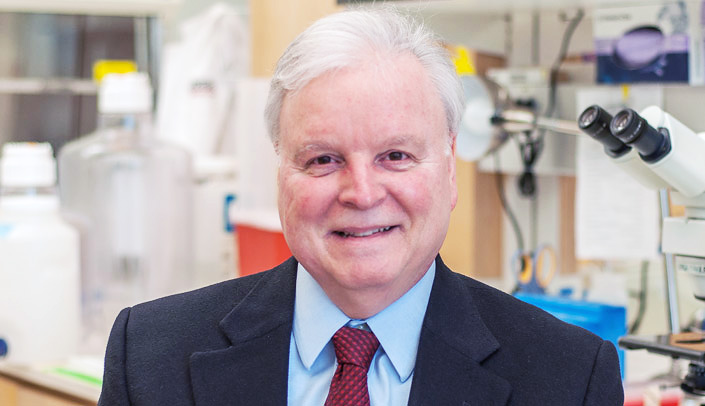UNMC researcher William Rizzo, M.D., has received a five-year, $3.3 million grant to study 10 rare diseases that affect children beginning in infancy or early childhood and throughout their life.
Dr. Rizzo is part of a consortia of 22 researchers who will collaborate with 98 patient advocacy groups to advance clinical research and investigate new treatments for children with rare diseases. The collaborations are made possible through $29 million in grants from the National Institutes of Health to expand the Rare Diseases Clinical Research Network, which is led by NIH’s National Center for Advancing Translational Sciences (NCATS).
Consortium
The Sterol and Isoprenoid Research Consortium (STAIR) studies a group of rare, inherited metabolic diseases that often go undiagnosed and have puzzling symptoms. Even after diagnosis, the diseases have no effective therapies. The consortium will uncover relevant knowledge that can advance the diagnosis and therapeutic options for patients with these rare diseases.
Some of the consortia include:
- Vanderbilt University, Nashville
- Baylor College of Medicine, Houston
- University of Miami
- University of California, San Francisco
- Fred Hutchinson Cancer Research Center, Seattle
- Emory University, Atlanta
- Mayo Clinic, Rochester, Minn.
- Columbia University Health Sciences, New York
The diseases Dr. Rizzo treats and studies are probably unfamiliar to most people. They influence the pathway for cholesterol synthesis and metabolism and include diseases such as Sjogren-Larsson syndrome, Smith-Lemli-Opitz syndrome and Hyperimmunoglobulinemia D or Hyper-IgD syndrome. Some of the diseases cause intellectual disabilities, behavior changes and/or physical problems. One disease causes recurrent fevers and rash every four to six weeks for a lifetime.
Dr. Rizzo said several of the diseases are so rare that between 500 and 1,000 children nationwide may be affected. Some diseases are even more rare than that, he added.
Dr. Rizzo will conduct clinical research studies with patients with the rare diseases using a network in the U.S. and internationally.
“New therapies require knowing the natural progression of the disease. We will learn what happens over time to patients — medical problems and complications and what therapies will be required,” said Dr. Rizzo, a professor of pediatrics and chair of the UNMC division of inherited metabolic diseases. “In many diseases, there’s no specific therapy that works. A physician may see only one or two patients with this disease in the course of his or her career.”
According to the NIH, there are several thousand rare diseases, of which only a few hundred have any treatments available. Combined, rare diseases affect an estimated 25 million Americans.
To develop new treatments, Dr. Rizzo said families with loved ones affected are critically important to learning more about the diseases.
“Patient advocacy groups help increase awareness of the diseases, support each other, raise funds and sponsor family meetings. They partner with us to identify new patients and help us design some studies. We recruit patients from all over the country,” Dr. Rizzo said.
Some obstacles to developing rare disease treatments include difficulties in diagnosis, widely dispersed patients and scientific experts, a perception of high risk, and a lack of data from natural history studies, which follow a group of people with a specific medical condition over time.
